TheMeInTeam
If A implies B...
- Joined
- Jan 26, 2008
- Messages
- 27,995
This part is a x-post from bug reports:
I guess I've never officially reported this bug, just complained about it extensively elsewhere. The governor thinks we're in vanilla 1.0, and would suck even there. It ignores emphasis commands when building wealth/research now. Take a look:
First, we take a look at a city emphasizing commerce, building something normally:
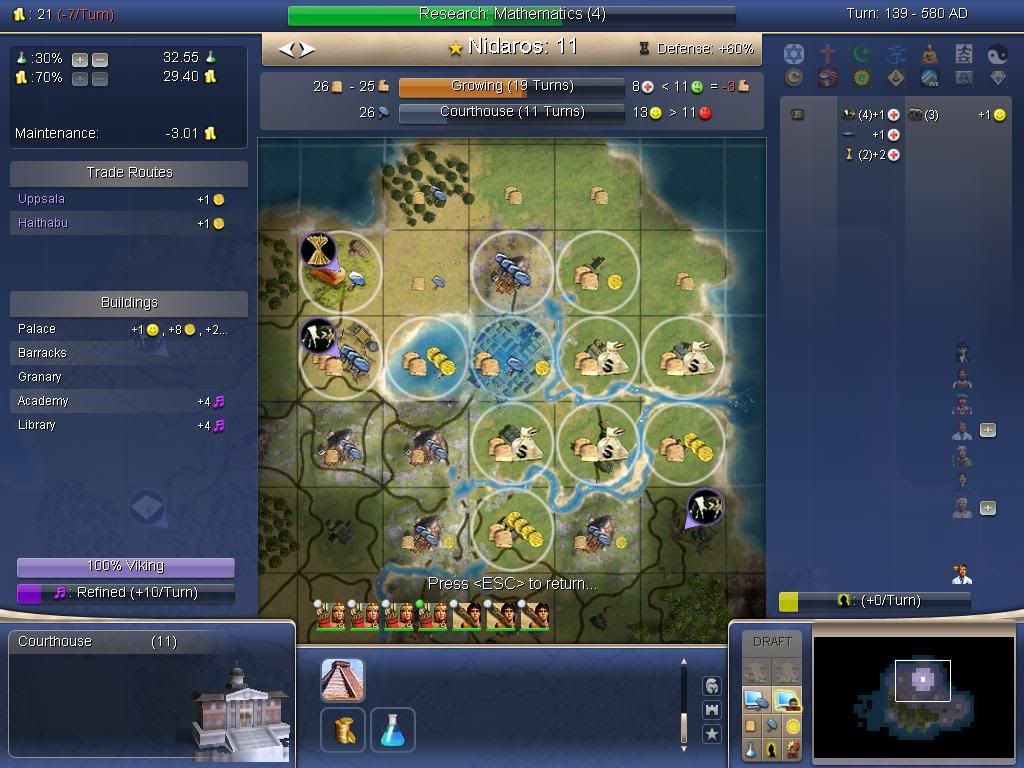
Looks fine to me. What happens when we build wealth, which supposedly wants to max gold?

We move off the mine to work an unimproved tile that does nothing but eat a citizen slot? What? And before we get any "works as intended" ignorance here, let's see what happens if we just disable the governor before clicking wealth:
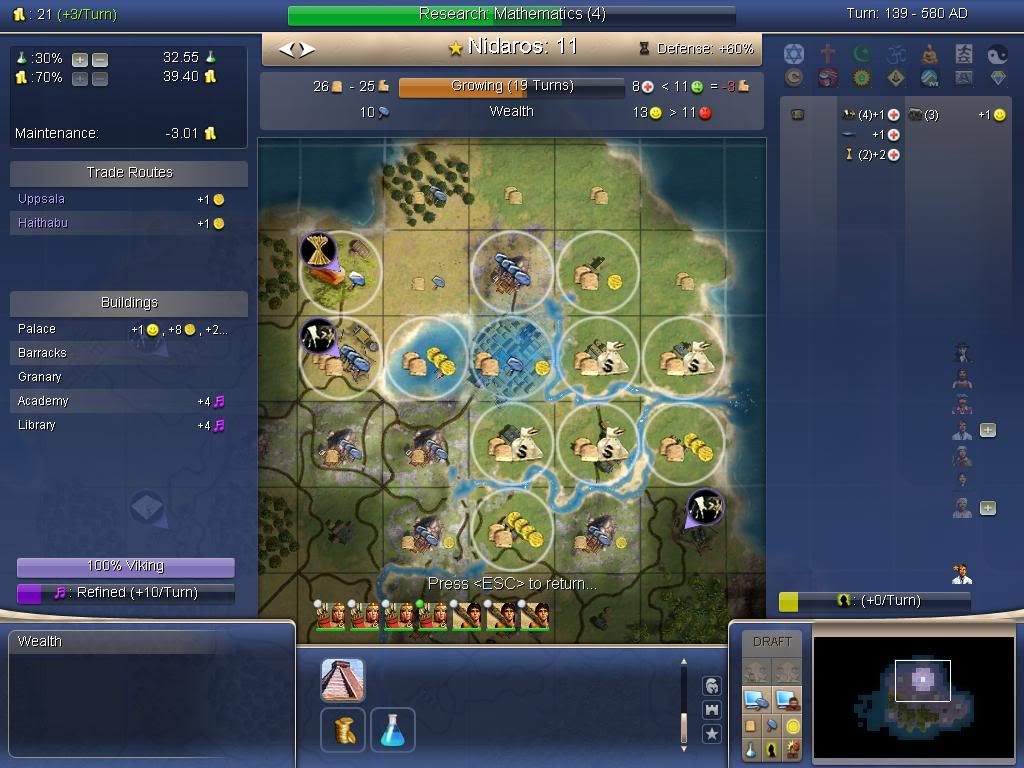
More gold. Novel concept.
Alright, next situation. This time, we're telling the governor to EMPHASIZE HAMMERS. In theory, this would work hammer tiles, and when we're not building wealth, it seems to do it like it should:

So, what happens when we build wealth while emphasizing those hammers?
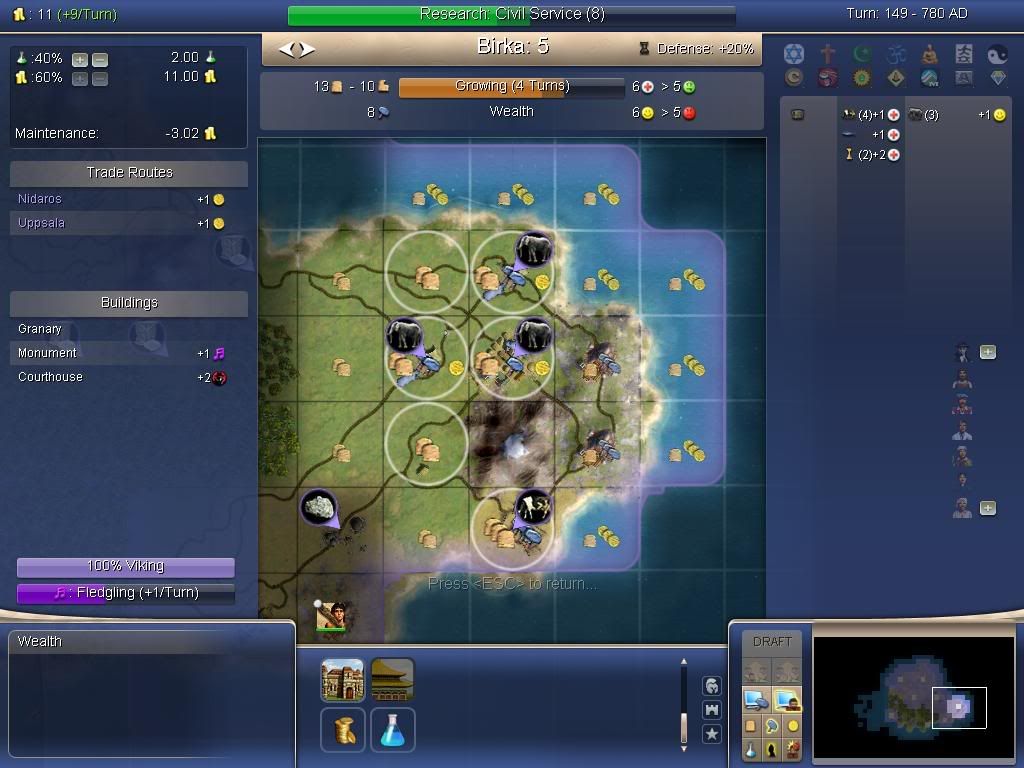
Again, what's up with this? I'll try to keep the forum family friendly here, but believe me it's taking a LOT of restraint. A lot. So what happens if the governor assigned tiles like it SHOULD assign them?
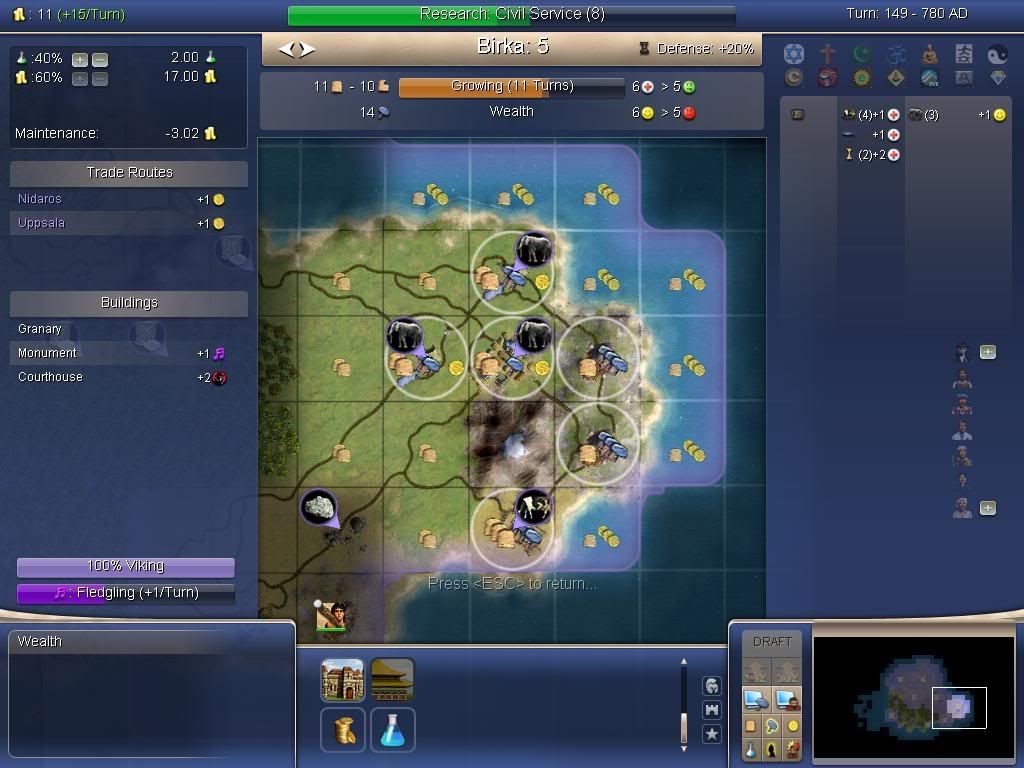
TWO SLIDER NOTCHES there (if this difference is taken across all cities that are building wealth).
Now, I have heard that back in 'nilla building wealth used to actually go through gold commerce multipliers, so maybe this was slightly more passable then (not sure how that worked). Maybe, but I doubt it since we're seeing unimproved tiles chosen that are yielding absolutely nothing to the city, while other tiles are ignored.
Nevertheless, I don't care what happened in history, the governor is ACTIVELY SELECTING TILES TO OPPOSE WHAT YOU ARE SPECIFICALLY INSTRUCTING IT TO DO. But only when building wealth, research, and possibly culture. It is deliberately decreasing the raw output of the output you instruct it to prioritize.
This is a pretty material bug. It would be far superior if the game just ignored that we build wealth and act like we're making a normal building/unit, rather than forcing us to disable to governor to keep it from doing something that is indisputably idiotic.
Suggestions
These could make the governor better, and the AI better when it uses build wealth or research:
1. Make building wealth or research work the same tiles as an ordinary building or unit.
2. Put less emphasis on growing to the cap unless the tile improvements are in place. Working unimproved tiles isn't good for the human and it isn't good for the AI either. Don't do it.
3. Tighten worker improvement assignments based on city emphasis (for better AI, consider having the AI pick an emphasis based on tile criteria and stick with it, should also improve national wonder placement automatically as a result).
4. The build selection governor chooses research usually, even though wealth is *almost always* more powerful, because the research multipliers and even academies are usually available earlier.
Having automated human governors AND the AI governors working the proper tiles would give it a huge boost. The biggest issue here by far is lowering the short (and even long term) output of a city by pulling citizens off of hammer tiles...even with hammer emphasis on...while building wealth/research. Some AIs actually choose to build wealth or research with decent consistency (I know toku is somewhat known for doing this and going early alpha), so this could only help strengthen them.
I guess I've never officially reported this bug, just complained about it extensively elsewhere. The governor thinks we're in vanilla 1.0, and would suck even there. It ignores emphasis commands when building wealth/research now. Take a look:
First, we take a look at a city emphasizing commerce, building something normally:
Spoiler :

Looks fine to me. What happens when we build wealth, which supposedly wants to max gold?
Spoiler :

We move off the mine to work an unimproved tile that does nothing but eat a citizen slot? What? And before we get any "works as intended" ignorance here, let's see what happens if we just disable the governor before clicking wealth:
Spoiler :

More gold. Novel concept.
Alright, next situation. This time, we're telling the governor to EMPHASIZE HAMMERS. In theory, this would work hammer tiles, and when we're not building wealth, it seems to do it like it should:
Spoiler :

So, what happens when we build wealth while emphasizing those hammers?
Spoiler :

Again, what's up with this? I'll try to keep the forum family friendly here, but believe me it's taking a LOT of restraint. A lot. So what happens if the governor assigned tiles like it SHOULD assign them?
Spoiler :

TWO SLIDER NOTCHES there (if this difference is taken across all cities that are building wealth).
Now, I have heard that back in 'nilla building wealth used to actually go through gold commerce multipliers, so maybe this was slightly more passable then (not sure how that worked). Maybe, but I doubt it since we're seeing unimproved tiles chosen that are yielding absolutely nothing to the city, while other tiles are ignored.
Nevertheless, I don't care what happened in history, the governor is ACTIVELY SELECTING TILES TO OPPOSE WHAT YOU ARE SPECIFICALLY INSTRUCTING IT TO DO. But only when building wealth, research, and possibly culture. It is deliberately decreasing the raw output of the output you instruct it to prioritize.
This is a pretty material bug. It would be far superior if the game just ignored that we build wealth and act like we're making a normal building/unit, rather than forcing us to disable to governor to keep it from doing something that is indisputably idiotic.
Suggestions
These could make the governor better, and the AI better when it uses build wealth or research:
1. Make building wealth or research work the same tiles as an ordinary building or unit.
2. Put less emphasis on growing to the cap unless the tile improvements are in place. Working unimproved tiles isn't good for the human and it isn't good for the AI either. Don't do it.
3. Tighten worker improvement assignments based on city emphasis (for better AI, consider having the AI pick an emphasis based on tile criteria and stick with it, should also improve national wonder placement automatically as a result).
4. The build selection governor chooses research usually, even though wealth is *almost always* more powerful, because the research multipliers and even academies are usually available earlier.
Having automated human governors AND the AI governors working the proper tiles would give it a huge boost. The biggest issue here by far is lowering the short (and even long term) output of a city by pulling citizens off of hammer tiles...even with hammer emphasis on...while building wealth/research. Some AIs actually choose to build wealth or research with decent consistency (I know toku is somewhat known for doing this and going early alpha), so this could only help strengthen them.


 to convert directly into
to convert directly into  or :research:. Directly generating commerce using hammers is IMPOSSIBLE. Also, when doing this, the only multipliers relevant to the hammers converted are hammer multipliers. The gold can later be applied to commerce, but only a tiny fraction of that gold gets re-applied to commerce in that city. If you're running a high science or gold slider, very little of the opposite can be produced by commerce. So rather than what you said, working the mine is almost always superior to working the crap commerce tile for gold. In fact, to pull an even amount of gold with 3 commerce, you'd need to be at 0% of anything else assuming equal multipliers. Humans tend not to dwell there long, and I strongly doubt the AI does for any reasonable periods...at least not on difficulties above noble.
or :research:. Directly generating commerce using hammers is IMPOSSIBLE. Also, when doing this, the only multipliers relevant to the hammers converted are hammer multipliers. The gold can later be applied to commerce, but only a tiny fraction of that gold gets re-applied to commerce in that city. If you're running a high science or gold slider, very little of the opposite can be produced by commerce. So rather than what you said, working the mine is almost always superior to working the crap commerce tile for gold. In fact, to pull an even amount of gold with 3 commerce, you'd need to be at 0% of anything else assuming equal multipliers. Humans tend not to dwell there long, and I strongly doubt the AI does for any reasonable periods...at least not on difficulties above noble. over 6
over 6 .
.
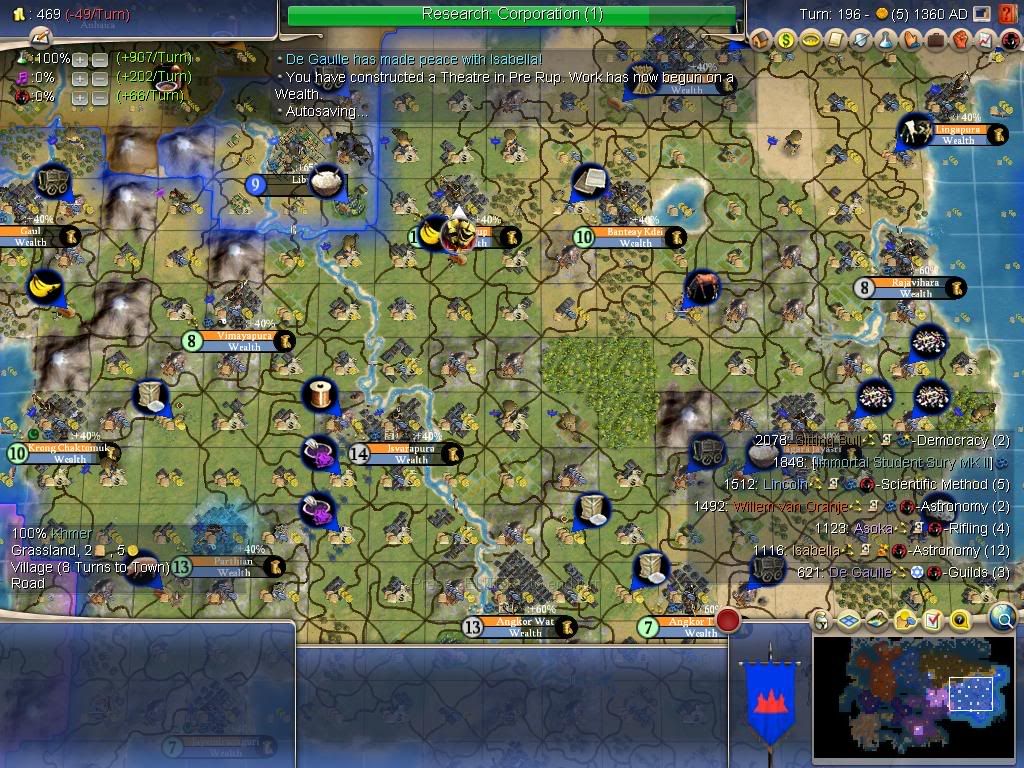
 ,44
,44

